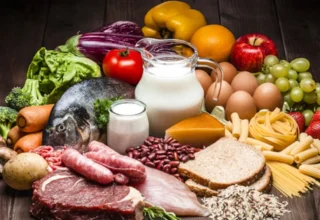
As we age, the foods we eat can greatly affect our fitness, appearance, quality of life, and disease risk.
Our bodies rely on various nutrients to support the natural aging process. Some nutrients may help slow signs of aging, such as by promoting healthy skin.
It’s important to note that eating specific foods isn’t going to make you look noticeably younger, and that nutrition is only one aspect of aging well.
Still, adding nutrient-dense foods to your diet can help you look and feel your best as you get older. In general, try to eat:
- healthy sources of protein
- healthy fats
- foods that are rich in antioxidants
Here are 10 nutritious foods that support healthy aging.
- Extra virgin olive oil
Extra virgin olive oil is one of the healthiest oils on earth. It’s rich in healthy fats and antioxidants that help reduce inflammation and oxidative damage caused by an imbalance of free radicals in the body.
A diet rich in olive oil has been linked to a lower risk of chronic diseases, including
- heart disease
- type 2 diabetes
- metabolic syndrome
- certain types of cancer
Inparticular, monounsaturated fats (MUFAs) make up about 73% of olive oil. Some studies have shown that a diet rich in MUFAs may help reduce skin aging thanks to the strong anti-inflammatory effects of these healthy fats.
Extra virgin olive oil is also high in antioxidants, such as tocopherols and beta carotene, as well as phenolic compounds that also have anti-inflammatory properties.
In fact, one 2012 study found that people who consumed a diet rich in MUFAs from olive oil had a lower risk of severe skin aging.
The authors suggested that the anti-inflammatory properties of both MUFAs and antioxidants found in olive oil were most likely responsible for this effect.
Ideally, choose cold pressed extra virgin olive oil because it’s higher in antioxidants and less processed than oils that are extracted using other methods. Try adding it to a salad or dip.
- Green tea
Green tea is high in antioxidants, which can help fight free radicals in the body.
Free radicals are unstable molecules created as a byproduct of normal cell functioning. They can also form in response to stressors from the external environment, such as ultraviolet (UV) light or tobacco smoke. Free radicals can damage your cells if they’re present at high levels.
That’s where antioxidants come in. These molecules stabilize free radicals so they’re unable to cause damage. You usually get antioxidants through your diet like from green tea.
Green tea is particularly high in antioxidants called polyphenols. Specifically, it’s high in epigallocatechin gallate (EGCG), catechins, and gallic acid.
These may reduce your risk of:
- heart disease
- neurological decline
- premature aging
- other chronic diseases
The polyphenols found in green tea may help reduce external skin aging from environmental stressors such as the sun and pollution by scavenging free radicals before they damage the skin.
In fact, many skin care products contain green tea extract for its antioxidant and antiaging properties. However, more research is needed before green tea products can be recommended to reduce skin aging.
That said, consuming a diet high in antioxidants is associated with a reduced risk of chronic disease and healthier skin. And drinking green tea can be a great way to get more antioxidants into your diet.
- Fatty Fish
Fatty fish is a highly nutritious food that can promote healthy skin.
Its long-chain omega-3 fats are beneficial against heart disease, inflammation, and many other issues.
Furthermore, research has shown that omega-3 fatty acids are linked to a strong skin barrier and may help decrease inflammation that damages the skin.
Salmon, one of the most popular types of fatty fish, has additional aspects that may help support your skin’s health.
First, it contains a carotenoid antioxidant called astaxanthin, which is responsible for the pink color of salmon.
In one study, people with sun-damaged skin consumed a combination of astaxanthin and collagen for 12 weeks.
As a result, they experienced significant improvements in skin elasticity and hydration. However, while these results seem positive, it’s unknown whether the effects were due to astaxanthin, collagen, or both.
Plus, salmon and other fatty fish are high in protein, which is important to eat so your body can produce collagen and elastin. These two molecules are responsible for skin’s strength, plumpness, and elasticity. Eating protein also promotes wound healing.
Finally, fish is high in selenium. This mineral and antioxidant plays a role in DNA synthesis and repair and may help reduce and prevent skin damage from UV light. Having adequate levels in the body may reduce the severity of skin diseases like psoriasis.
Dark chocolate or cocoa
Dark chocolate is a rich source of polyphenols, which act as antioxidants in the body.
In particular, it contains flavanols, which are linked to numerous health benefits, such as a lower risk of
- heart disease
- type 2 diabetes
- cognitive decline
Additionally, it’s thought that a diet rich in flavanols and other antioxidants can help protect the skin from sun damage and help slow skin aging.
In one high quality 24-week study, participants that consumed a flavanol-rich cocoa beverage experienced significant improvements in skin elasticity and facial wrinkles compared with those in the control group.
While these results are promising, other studies have not observed that dark chocolate offers benefits for skin appearance or aging
Remember, the higher the cocoa content, the higher the flavanol content. Therefore, if you want to add dark chocolate to your diet, choose a variety with at least 70% cocoa solids and little added sugar.
Vegetables
Most vegetables are extremely nutrient-dense and low in calories.
They contain antioxidants, which help reduce the risk of heart disease, cataracts, and certain cancers
Many vegetables are also high in carotenoids, like beta carotene and lycopene. Some research suggests that a diet high in carotenoids may protect the skin against the sun’s UV rays, which are the main cause of premature skin aging.
Some of the best sources of beta carotene are:
- carrots
- pumpkin
- sweet potatoes
Many vegetables are also rich in vitamin C, which is a potent antioxidant. Vitamin C also plays a crucial role in collagen production. Collagen is a key building block of the skin, but its production begins to decline after the age of 25
Vegetables with the highest vitamin C content include leafy greens, bell peppers, tomatoes, and broccoli.
It’s important to eat vegetables of different colors, as each color represents different antioxidants that can benefit your skin and overall health (42Trusted Source).
Aim to have at least two vegetables at each meal and always protect your skin using sunscreen.






































